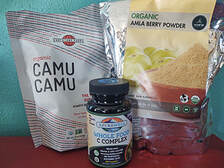
In 2023 I learned the supplements I had been using for years were not serving me as I had been taught. I learned that the Linus Pauling research touted in the Truth About Cancer summits was funded by the Rockefeller's. When I learned this, it lost all credibility in my mind. Yet, that research continues to be touted by many holistic practitioners... but documented in Morley Robbin's books.
All Vitamin C is NOT THE SAME.
Synthetic Vitamin C depletes copper in the body, and copper is essential for many, many functions of the body. Because of the importance of Copper, I cannot help but wonder if there is a nefarious underlying to the big push for use of ascorbic acid.
Often times a supplement will be marketed as Vitamin C, but then when you read the label it’s actually Ascorbic Acid, and they are different! When I questioned a company about the use of ascorbic acid vs a whole food C – I am told that in order to list the amount of C on the label only ascorbic acid is regulated by the FDA. However, when I look on the label of newly formulated Azure Well Whole Food C there is a measurement listed as: Vitamin C (from Vitamin C Fractions Extracted from Amla) 135 mg.
It is duly noted that this amount may be less than what you might see on a container of ascorbic acid, however, with whole food C you are getting the complete package, and therefore it is more potent. I used to use the Nutribiotic brand, or Liposomal C recommended in TTAC talks - but not anymore! I've tossed them.
Whole food supplement vitamin C is derived from real fruits and vegetables, which provide a broader spectrum of nutrients beyond ascorbic acid on its own. This includes bioflavonoids, phytonutrients, and other compounds that work synergistically to provide benefits and support your health.
Ascorbic acid, in contrast, is a synthetic form of vitamin C, containing only the isolated ascorbic acid molecule extracted in a lab. While it can provide some benefits of vitamin C, it lacks the diverse array of nutrients found in whole food sources, such as amla and camu camu berries, which contain a greater amount of Vitamin C benefits than oranges or grapefruit! Did you know that making tea from White Pine needles is also a good source of Vitamin C? Any synthetic product is going to offer a less holistic nutritional approach. The body also responds less favorably to synthetic supplements. If you have ever taken large amounts of ascorbic acid when you have been sick – you may have also spent quite a bit of time in the bathroom.
At Purely Living we no longer recommend ascorbic acid. There is a lot of truth to becoming more wise as we age – especially if you are wired for ongoing research and learning as I am. Now, does that mean I am tossing every supplement that has ascorbic acid on the label? Let me be clear, I am not. If there is a minute amount of ascorbic acid in a product that has served you well, don’t toss it. But you might prayerfully consider whether or not to repurchase when whole food options are available.
Choosing whole food supplement vitamin C will undoubtedly offer a more comprehensive and natural way to support your well-being. I will be honest; I tried Camu Camu and Amla Berry powders. I was surprised, as a berry, that they are bitter in flavor. I utilize these powders in my smoothies for tolerance. I am finding the Whole Food capsule supplement from Azure Well to be much easier. For those with adrenal fatigue, I recommend the Adrenal Food from Azure, which is higher in whole food C, as well as thyroid supporting potassium and trace minerals.
It is my hope you now have a better understanding of whole food vs. synthetic Vitamin C.
Be well,
Rita S.


 RSS Feed
RSS Feed
